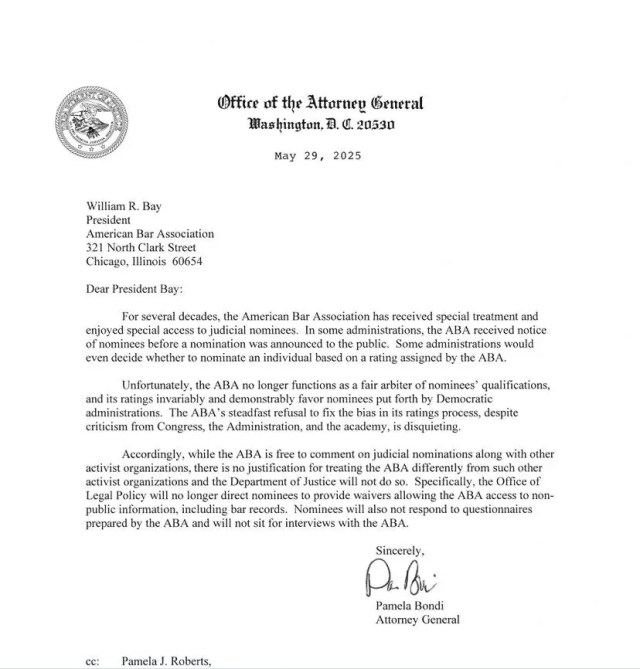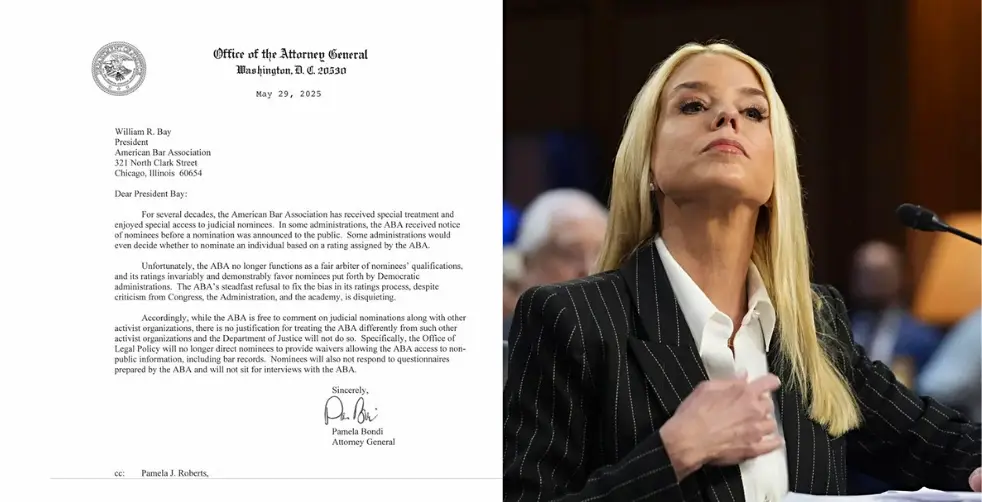It begins with a letter. Printed on heavy letterhead, bearing the seal of the Department of Justice, signed by Pamela Bondi, Trump’s Attorney General. What is written there sounds harmless – almost bureaucratically dry. Yet behind the lines lies a dramatic act of power redistribution, an attack on one of the last remaining bulwarks of American democracy: the independent evaluation of the judiciary.
For decades, the American Bar Association – ABA for short – served as a civil conscience of the US judiciary. An institution that did not judge guilt or innocence, but competence, decency, and integrity. Anyone aspiring to become a judge had to undergo questioning, be scrutinized, be evaluated. “Well qualified,” “qualified,” “not qualified” – these were the assessments that mattered, because they were based on experience, expertise, and ethical judgment, not on party affiliation or opportunism. Democrats and Republicans alike respected this practice. Until now.
Because now, Bondi declares: enough. The ABA has lost its neutrality, she says – it is biased, too democratic, too critical of the system. In her letter, she writes verbatim:
“Unfortunately, the ABA no longer serves as a neutral arbiter of the qualifications of judicial nominees.”
The organization is accused of consistently favoring nominees proposed by Democratic administrations – an accusation that has remained unproven for years, but now serves as the political basis for a radical break.
„Leider fungiert die ABA inzwischen nicht mehr als unparteiischer Maßstab für die Qualifikation von Kandidatinnen und Kandidaten.“
Man wirft der Organisation vor, Bewerberinnen und Bewerber demokratischer Regierungen systematisch zu bevorzugen – ein Vorwurf, der seit Jahren unbelegt im Raum steht, aber nun politische Grundlage für einen radikalen Bruch ist.

Bondi continues:
“The ABA’s persistent refusal to address this bias in its evaluation process – despite concerns raised by Congress, the Administration, and the legal community – is troubling.”
What is unfolding here is not an administrative procedure. It is a systematic delegitimization of oversight. The judiciary, once an independent pillar in the structure of checks and balances, is being gradually absorbed by the executive. Those loyal to the Trump administration can hope. Those who think critically are slowed down. And those who dare to speak out publicly against the president’s policies lose – their position, their future, sometimes even their citizenship.
Was sich hier vollzieht, ist kein Verwaltungsakt. Es ist eine systematische Delegitimierung der Kontrolle. Die Justiz, einst unabhängiger Pfeiler im Gefüge der Gewaltenteilung, wird Stück für Stück in die Exekutive überführt. Wer sich loyal zur Trump-Regierung verhält, darf hoffen. Wer kritisch denkt, wird ausgebremst. Und wer gar wagt, sich öffentlich gegen die Politik des Präsidenten zu stellen, verliert – seinen Posten, seine Zukunft, manchmal sogar seine Staatsbürgerschaft.
Informants from within the Department of Justice report, under strict anonymity, that lists have long existed internally. Names of candidates deemed “ideologically reliable” by the administration – even if they lack any legal qualifications. Former military lawyers, conspiracy theorists with law degrees, ultraconservative activists with ties to evangelical networks. All of them ready to bend the law to suit the president’s will. In the past, such lists would have gathered dust in a drawer. Today, they serve as the basis of judicial policy.
Bondi macht unmissverständlich klar, dass für zivilgesellschaftliche Kontrolle kein Platz mehr sei:
Bondi makes it unmistakably clear that there is no longer any room for civil oversight:
“Although the ABA, like other activist organizations, is free to express its views on judicial nominees, there is no reason to afford it preferential treatment.”
Those who still dissent are isolated. A judge who ruled against Trump’s immigration policy found herself retired just a few weeks later. A constitutional law professor who spoke of “legal decay” at a conference received a subpoena for alleged tax violations. An NGO advocating for press freedom lost its nonprofit status overnight. And the ABA? It may still speak – but no one is required to listen anymore.
Bondi’s conclusion is coldly consistent:
“Specifically, the Office of Legal Policy will no longer provide the ABA with access to non-public information, including candidate personnel files. Nominees will also no longer respond to ABA questionnaires or participate in ABA interviews.”
It is the well-known erosion through normalization. The slow shift from alarm to acceptance. Public outrage has long become ritualized, its effect fizzling like a cry in an empty hall. What remains is the unchecked advance of a government that does not fear oversight – it abolishes it. The judiciary is no longer meant to judge – it is meant to execute. And it is meant, like the president himself, to be accountable to no one.
Anyone observing the political climate in the United States with a clear eye can see the pattern. There is no need for a loud bang, no constitutional amendment, no coup. A democracy dies in small steps. With every judge who is no longer independent. With every institution silenced. With every evaluation that no longer counts.
Die Entscheidung, die ABA aus dem Justizprozess zu entfernen, mag auf den ersten Blick juristisch-technisch erscheinen. Doch sie ist ein Fanal. Ein deutliches Signal, dass sich die Trump-Regierung nicht länger mit der Fassade liberaler Demokratie aufhält. Sie braucht keine Masken mehr. Sie regiert offen und willfährig – und sucht sich jetzt die Richter, die ihren Kurs bestätigen. Was noch bleibt, sind Beobachter. Und die stille Frage: Wie viele Instanzen müssen noch fallen, bevor jemand aufsteht?
